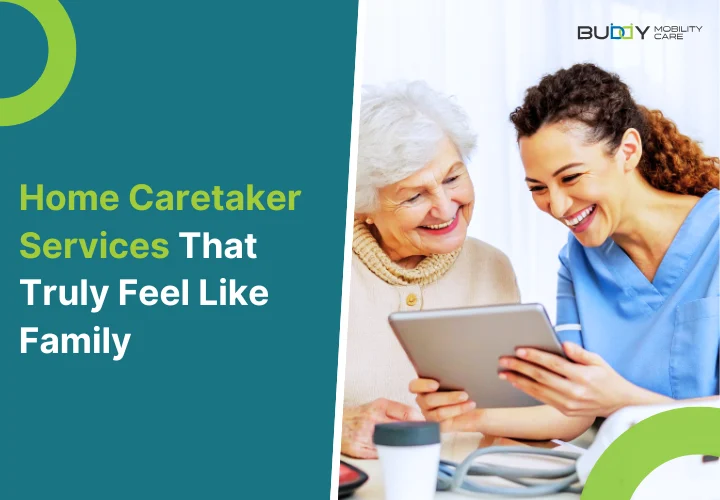Why Supporting Emotional Health Is Crucial in Elderly Care
Ensuring physical needs are met is just one aspect of elderly care. Emotional well-being is important for the general health and the standard of living of the elderly. Due to rapidly changing lifestyles, health, and social relationships, the older generation is facing increasing emotional difficulties. Understanding what are emotional needs of elderly is essential for providing effective care This blog explores the difficulties seniors go through and the role senior caregiving services play in helping them lead full lives
Common Emotional Challenges Faced by the Elderly
People have emerging and more frequent emotional difficulties as they get older, which affects them mentally. Some of them are:
- Loneliness and Isolation: Older adults get more lonely in old age, as their mobility decreases as well as social engagement opportunities.
- Depression and anxiety: Feelings of anxiety are amplified with rising long-term medical conditions.
- Grief: Losing a spouse, friend, or family member can result in profound grief, affecting their emotional stability.
- Lack of Purpose: Senior citizens may not be able to find their lives meaningful after retirement.
In order to properly address their emotional needs, elderly caring service workers need to understand these problems thoroughly.
The Role of Emotional Well-Being in Overall Health
Emotional well-being impacts longevity and physical health. Here are some ways how mental health is related to overall health:
- Better Immune Function: Emotionally stable seniors are more likely to fight off infections and recover from diseases.
- Improved Cognitive Function: High emotional health lowers the chances of memory-related disorders and cognitive decline.
- Improved Quality of Life: Being positive builds resilience and also ensures happiness.
Incorporating mental health into the planned care for elderly services guarantees the long-term well-being of old people.
Importance of Social Connections and Support Systems
Social networks and support networks are essential to quality emotional health. Seniors having close social connections report feeling less depressed and anxious, according to studies. The reasons are:
- Sense of Belonging: Seniors who are a member of a community, whether it be through local organizations, friends, or family, feel a sense of belonging.
- Emotional Support: Emotional stress can be reduced by sharing new experiences together and maintaining contact.
- Encouraging Healthy Habits: Social networks for elderly in which they support each other and hold each other accountable to lead active lives is important.
- Mental Stimulation: Regular social activities like playing board games, group talks, and storytelling positively impact the emotional health of seniors.
- Support During Transitions: Having a strong support network makes handling significant life changes, such as relocating to assisted living or dealing with the death of a spouse easier.
Seniors should develop strong emotional bonds and engage in activities such as book clubs, community events, or group exercises with encouragement from their caregivers. Building relationships and maintaining them is an important part of leading a full life.
Role of Caregivers in Supporting Emotional Health
At Buddy, we are committed to providing excellent caregiving services to seniors and the elderly. Our professional home care services take care of your loved ones by ensuring:
- Active Listening: Building trust and understanding with senior citizens requires taking the time to hear their worries and stories.
- Encouraging Independence: Allowing seniors to participate in decision-making and daily tasks can boost their self-esteem and sense of control.
- Promoting Hobbies and Interests: Helping seniors engage in activities they enjoy—be it gardening, painting, or reading—can bring joy and purpose to their lives. Having patience and compassion is important while caring for old people struggling emotionally or cognitively.
- Promoting Physical Activity: Engaging in regular physical activity, such walking or gentle yoga, improves mood and lowers anxiety while also improving physical health. Exercise should be incorporated into regular routines with caregiver assistance.
- Secure, Upbeat Environment: Seniors, particularly those with anxiety or memory problems, feel more secure in a peaceful and orderly environment. Minor adjustments such as playing calming music or keeping sentimental items in their room strategically can have a significant impact.
Additionally, professional home care services meet the emotional needs of seniors by providing specialised training to their caregivers.
Conclusion
A key component of high-quality care for elderly is ensuring their emotional well-being. Seniors can lead happier and more fulfilling lives if their emotional difficulties are addressed and an active lifestyle is encouraged by caregivers. Elderly people enjoy their lives with dignity, given their emotional health is a priority.
Select the right caregiving service which takes care of both the physical and mental health of the elderly. By working together, we can make sure our senior loved ones have the assistance and care they need to live happy, fulfilling lives




